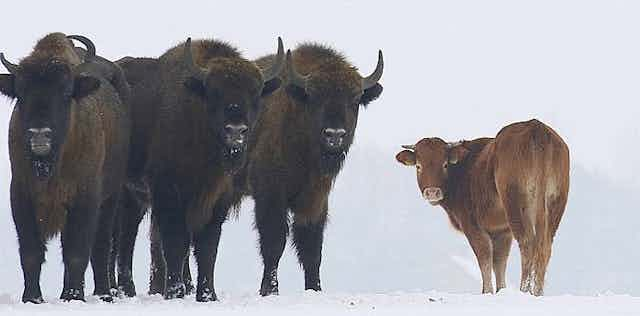Animals do a lot for us. So what should we do for them?
Dexter, an emotional support peacock, made global headlines recently when United Airlines refused to allow him on a flight.
His story is the latest to reanimate the public discussion about the certification and regulation of service animals, and the rights of people with disabilities. But this unusual situation is also an opportunity to reflect on the work we give animals, which species we employ and what our responsibilities are to them.
We have long used the labour of animals — few communities in Canada would have been built without horses’ strength, power and co-operation.
Much like people, today’s animals are less likely to be used for manual labour, and are more often employed in service work. They assist with law enforcement, and even sniff out endangered species, smuggled goods and insect infestations.
Service animals are typically paired with humans and engaged in full-time, round-the-clock labour. They may physically guide someone, assist with daily tasks or monitor the person’s physical and emotional state, then respond with a warning, an intervention or calming touch.
Therapy animals usually work part-time, and either are visited at care farms or are transported to long-term care homes, schools, libraries and detention centres to participate in a range of programs and interactions.

In Canada, we also now have institutional or facility dogs that comfort and support child witnesses as they participate in court cases.
Animals — whether they are dogs, horses, chickens or rats —are using an intricate combination of their physical, intellectual and emotional abilities in their work for us.
Rats, for example, are now employed in a range of ways, including for detecting land mines and forewarning people of seizures.
Academic research is beginning to reveal the depth and breadth of the cognitive skills, emotional lives and cultural practices of animals of all sizes. When working for us, many animals engage in nuanced communication, they control or suppress their feelings to behave appropriately, and actively assess people and complex environments.
In most cases, particularly when we entrust animals to care for us, we have evolved beyond seeing them simply as beasts of burden. We are more likely to recognize the active roles animals play and the choices they make and see them as subjects, not simply objects.
Yet most animals are still legally positioned as property, and their work lives are ultimately governed by humans. As a result, we have significant responsibilities.
The largest group of domesticated vertebrate animals in Canada — the 700 million farmed creatures who live short, difficult lives, and then are killed to be consumed as food — is an elephant in the room, so to speak.

We could view the required and repeated physical production of babies, milk and eggs as a kind of bodily work.
Whether we see farmed animals as working or not, there are crucial discussions about their living conditions taking place, and whether we should be using animals in this way at all, especially given the expansion of plant-based foods and drinks, and lab-grown “clean meat.”
As a labour studies scholar who has been studying work involving animals for a number of years, I have seen the good, the bad, the ugly and the more complicated. A few things are clear, however.
Not all species or individual animals want to work for us, and we ought to recognize this fact. Work should be about collaboration, not coercion.
If some animals are going to work with and for us, we should only offer them humane jobs and pay careful attention to their work lives in a full sense. This includes their hours of work, their leisure and social opportunities and their lives after their formal jobs have ended. We must prioritize not only animals’ physical health, but also their psychological well-being.
Clearly the world of work is changing for people and animals alike, and it is challenging our conventional ideas and approaches. As a result, we ought to harness the potential of solidarity and reciprocity in our relationships, as well as in our political arenas.
As a start, we should strengthen and expand our antiquated animal cruelty laws, and properly fund their enforcement.
But we also need to create new policies and programs that reflect and genuinely respect the diverse realities of animals’ labour, interests and lives. In other words, it’s time we do more political work for the animals who do so much for us.

